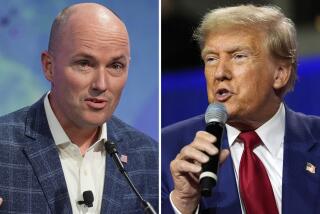GOP Is Back on the Anti-China Horse
- Share via
Last week, only hours after the death of roughhewn conservative icon Barry Goldwater, his more polished political descendants gathered in Orange County to hear a full-scale assault on the Clinton administration’s Asia policy. The attendees at the policy-wonk retreat of the Claremont Institute were lawyers, business people, politicians and professors. But the star, an inheritor of the Goldwater mantle, was Rep. Christopher Cox (R-Newport Beach), from whom America is likely to hear a great deal more.
Cox is no ruffian Goldwater, whose nuclear-tipped anti-communist extremism once frightened at least as many Americans as it did Russkies. On the contrary, the boyish-looking, 10-year congressional veteran is a Harvard Law and Business schools graduate who does his homework and is careful with his facts. His colleagues in 1994 made him head of the Republican Policy Committee and more recently handed him the important and sensitive House probe into allegations about U.S. technology transfers to China. It’s not Cox’s style to try to scare anyone to death but he can certainly charm the pants off anyone; compared, say, to Rep. Dan Burton (R- Ind.), the House GOP’s loose cannon, in the deportment department Cox is something akin to the second coming of former Secretary of State George Shultz.
Cox’s core critique of Clinton is shaping up as the GOP’s playbook assault on U.S. foreign policy. Many Republicans will argue that because America has been soft on China, which helped arm Pakistan right under our noses, we have lost India. They will say of Clinton’s trip later this month to China that the president’s posture there, because he is to be officially greeted at Tiananmen Square, will be more as a soft-on-China “supplicant” than stout champion of the Free World. Cox argues: “We will reach the nadir of our abandonment of human rights if Clinton appears at Tiananmen Square. It doesn’t do any good to be deferential to China. And isn’t it interesting that the U.S. should now seem to prefer communist China to democratic India? Maybe the only way India thought it could be taken seriously as a major power was to become a nuclear one. So now we’re left with U.S. sanctions on India and U.S. sanctions on Pakistan but we have good relations with the big communist country! Nice work.”
Because Clinton doesn’t focus on foreign policy frequently and carefully enough, Cox believes, the president tends to consider issues more in isolation than as part of an overall framework and tends to respond to them only when sorely pressed by some domestic constituency. The result is that important issues, like India’s insecurities, get lost in the shuffle, as do important friends, like Japan. “Maybe the Japanese will someday decide to go nuclear,” Cox muses. And, despite Japan’s postwar history of pacifism, he means it.
If GOP character attacks on Clinton continue to fall flat with the American people, the naive-on-China strategy will move front and center. And it has a chance of succeeding, especially if the Republicans let a relatively modulated and serious voice like Cox’s lead it. “There’s really very little difference between your views on China and mine,” Cox tried to reassure me over lunch. “It’s just that we and the Chinese speak different languages and operate amid centuries of mistrust.” Unfortunately, Cox’s macho approach to China, though popular domestically not only with the Republican right but also with the human-rights and labor-movement Democratic left, will only deepen that historic mistrust and scare much of the rest of the world, though probably not China. Cox claims that “there is no Democratic/Republican split on China; but there is an executive/legislative split. Does Congress have a role or should we just sit down and shut up?”
Cox intends the question rhetorically, of course. But the nation’s legislative branch is controlled by Republicans and the executive by Democrats, so the emerging showdown over China is inherently partisan. Thus in Israel, House Speaker Newt Gingrich vitiates the president’s voice in the Middle East; in Orange County, the Republican Party’s best and brightest openly knocks the country’s China policy just weeks before the first visit of a U.S. president to that surpassingly important nation in almost a decade.
It’s sad to see Republicans go the anti-China route. After all, on foreign policy, the Republican elephant, like the Democratic donkey, has never been a wholly ideological animal. Indeed, the world once applauded when Richard Nixon stopped exploiting China as a political punching bag and began respecting it as a central force in international relations. But Cox follows Goldwater in taking a tough line on China. Goldwater was quiet during Nixon’s epochal first trip to Beijing in 1971, no doubt for the sake of party unity. But by Nixon’s 1976 visit, after his Watergate pardon, Goldwater said publicly that the trip was in no one’s interest but Nixon’s.
Today’s conservative Republicans, even the most thoughtful ones, are again sharpening their teeth on China as they ache to take a big bite out of President Clinton’s astounding popularity. But the Republican tactic of trying to divide the nation over Clinton’s China policy is not in the national interest, because in the effort to diminish Clinton, they wind up diminishing America and run the risk of losing China.
More to Read
Get the L.A. Times Politics newsletter
Deeply reported insights into legislation, politics and policy from Sacramento, Washington and beyond. In your inbox twice per week.
You may occasionally receive promotional content from the Los Angeles Times.










